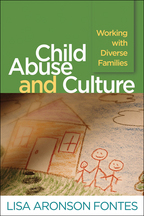Child Abuse and Culture
Working with Diverse Families
Lisa Aronson Fontes
Foreword by Jon R. Conte
HardcoverPaperbacke-bookprint + e-book
Hardcover
orderJanuary 6, 2005
ISBN 9781593851309
Price: $54.00 239 Pages
Size: 6" x 9"
Paperback
orderJanuary 18, 2008
ISBN 9781593856434
Price: $36.00239 Pages
Size: 6" x 9"
This expertly written book provides an accessible framework for culturally competent practice with children and families in child maltreatment cases. Numerous workable strategies and concrete examples are presented to help readers address cultural concerns at each stage of the assessment and intervention process. Professionals and students learn new ways of thinking about their own cultural viewpoints as they gain critical skills for maximizing the accuracy of assessments for physical and sexual abuse; overcoming language barriers in parent and child interviews; respecting families' values and beliefs while ensuring children's safety; creating a welcoming agency environment; and more.
“Provides a comprehensive presentation of complex cultural issues with abundant examples drawn from [the author's] experience as a psychologist, educator, and researcher....Appropriate for anyone providing social services to families, parents, or children....Deals with difficult and complicated subjects but is easy to read and understand. The book provides information in a manner that allows readers to quickly and easily apply new knowledge to their daily practice, and provides strategies to discuss difficult issues with children, parents, and fellow co-workers/clinicians. This book opens our eyes to areas crucial for true understanding of culture's role in family life. Since immigration and the increasing diversity of the American landscape will continue into the future, this book belongs on the reference shelf of every child welfare worker.”
—Prevention Researcher
“A pedagogical treasure....I have employed many strategies suggested in Child Abuse and Culture in my child advocacy class and in practice, and have found that students, as well as myself, are now learning how to approach their clients' cultural issues with more awareness, sensitivity, and respect.”
—Family Court Review
“A 'must read' if you work with child maltreatment in any capacity.”
—Journal of Systemic Therapies
“Provides a comprehensive presentation of complex cultural issues with abundant examples drawn from [the author's] experience as a psychologist, educator, and researcher....Appropriate for anyone providing social services to families, parents, or children....Deals with difficult and complicated subjects but is easy to read and understand. The book provides information in a manner that allows readers to quickly and easily apply new knowledge to their daily practice, and provides strategies to discuss difficult issues with children, parents, and fellow co-workers/clinicians. This book opens our eyes to areas crucial for true understanding of culture's role in family life. Since immigration and the increasing diversity of the American landscape will continue into the future, this book belongs on the reference shelf of every child welfare worker.”
—Prevention Researcher
“Lisa Aronson Fontes has devoted her career to understanding the diverse families who use child welfare services. This book distils the lessons she has learned and suggests strategies to make child welfare programs, and particularly child protection services, more effective in their work with families from diverse backgrounds and cultures. Fontes's writing is concise and to the point. She uses examples to illustrate major concepts and then describes practical steps agencies and individual workers can take to maximize their effectiveness. This book would serve as a great supplementary text for introductory child welfare classes at both the BA and MSW level.”
—Jeffrey L. Edleson, PhD, Dean and Professor, School of Social Welfare, University of California, Berkeley
“Well written and organized, this book provides practical ideas for making child protection services equitable for families from diverse racial and ethnic backgrounds—a topic that cannot be ignored in our multicultural societies. Grounding the work in a solid theoretical framework, Fontes sensitively addresses the various issues involved in making services and agencies culturally competent. This book is an essential read for undergraduate and graduate students in social work and related fields, as well as for practitioners and researchers.”
—Sarah Maiter, PhD, School of Social Work, Wilfrid Laurier University, Canada
“Dr. Fontes expertly interweaves the importance of using a cultural framework with practical suggestions for working with children and families. This book fills a key gap in the professional literature. Novice as well as experienced clinicians will find this book useful in helping them examine the cultural attitudes, biases, and strengths that affect their assessment, intervention, consultation, prevention, and training roles, particularly in relation to child maltreatment issues.”
—David A. Wolfe, PhD, Center for Addiction and Mental Health, London, Ontario, Canada
“Highly readable and instructive, this is an indispensable how-to guide for professionals and trainees in child protection services, hospitals, schools, and mental health programs. Fontes offers essential resources in the form of interviewing techniques and individual, group, and community approaches that are sensitive to ethnicity, race, social class, and gender. Fontes is compassionate and evenhanded—fair to all those involved with the difficult and life-transforming decisions precipitated by family violence in diverse populations.”
—Celia Jaes Falicov, PhD, past president, American Family Therapy Academy
“Children and families identified and served by the child welfare system are racially, ethnically, and culturally diverse. Moreover, children of color are disproportionately reported to child protection services and over represented in the child welfare system. This timely, informative book is thoughtful and inclusive, drawing on the literature on race, culture, and ethnicity as well as the child welfare literature. Fontes makes excellent use of illustrative case examples from the literature and her own practice experience. This book is a 'must read' for child welfare professionals, who should be child—and family—sensitive and culturally competent.”
—Kathleen Coulborn Faller, PhD, ACSW, School of Social Work, University of Michigan
Table of Contents
1. Multicultural Orientation to Child Maltreatment Work2. Working with Immigrant Families Affected by Child Maltreatment
3. Assessing Diverse Families for Child Maltreatment
4. Interviewing Diverse Children and Families about Maltreatment
5. Physical Discipline and Abuse
6. Child Sexual Abuse
7. Working with Interpreters in Child Maltreatment
8. Child Maltreatment Prevention and Parent Education
9. Improving the Cultural Competency of Your Child Maltreatment Agency or Organization
